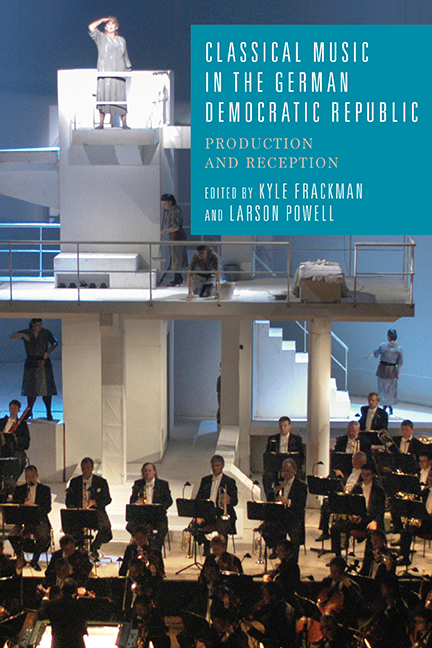Book contents
- Frontmatter
- Contents
- Acknowledgments
- List of Abbreviations
- Introduction: Music and Heritage in the German Democratic Republic
- 1 Provincialism, Modernity, and the Classical Heritage: The Administrative Structure of the GDR and the Situation of Music Production
- 2 Classicism as Anti-Fascist Heritage: Realism and Myth in Ernst Hermann Meyer’s Mansfelder Oratorium (1950)
- 3 Positioning Georg Knepler in the Musicological Discourse of the GDR
- 4 Ehrt euren Deutschen Meister: Reproducing Wagner in the GDR
- 5 The Embodiment of Collective Memory in Neue Odyssee
- 6 Marxism and Feminism in Ruth Berghaus’s Staging of Don Giovanni
- 7 Beyond the Gewandhaus: Mahler and the GDR
- 8 Hanns Eisler’s Funeral and Cultures of Commemoration in the GDR
- 9 Exile—Remigration—Socialist Realism: The Role of Classical Music in the Works of Paul Dessau
- 10 “What a Satisfying Task for a Composer!”: Paul Dessau’s Music for The German Story (. . .Du und mancher Kamerad)
- 11 Friedrich Schenker and the Third Way
- 12 A Prism of East German Music: Lothar Voigtländer
- Notes on the Contributors
- Index
Introduction: Music and Heritage in the German Democratic Republic
Published online by Cambridge University Press: 21 May 2021
- Frontmatter
- Contents
- Acknowledgments
- List of Abbreviations
- Introduction: Music and Heritage in the German Democratic Republic
- 1 Provincialism, Modernity, and the Classical Heritage: The Administrative Structure of the GDR and the Situation of Music Production
- 2 Classicism as Anti-Fascist Heritage: Realism and Myth in Ernst Hermann Meyer’s Mansfelder Oratorium (1950)
- 3 Positioning Georg Knepler in the Musicological Discourse of the GDR
- 4 Ehrt euren Deutschen Meister: Reproducing Wagner in the GDR
- 5 The Embodiment of Collective Memory in Neue Odyssee
- 6 Marxism and Feminism in Ruth Berghaus’s Staging of Don Giovanni
- 7 Beyond the Gewandhaus: Mahler and the GDR
- 8 Hanns Eisler’s Funeral and Cultures of Commemoration in the GDR
- 9 Exile—Remigration—Socialist Realism: The Role of Classical Music in the Works of Paul Dessau
- 10 “What a Satisfying Task for a Composer!”: Paul Dessau’s Music for The German Story (. . .Du und mancher Kamerad)
- 11 Friedrich Schenker and the Third Way
- 12 A Prism of East German Music: Lothar Voigtländer
- Notes on the Contributors
- Index
Summary
ALTHOUGH SCHOLARSHIP HAS BEGUN to recognize and evaluate classical music in the German Democratic Republic (GDR, East Germany), this tradition is still bracketed out of even recent English-language surveys of European musical modernism. There are at least two reasons for this. First, it is assumed—as was long the case with DEFA film—that classical composers in the GDR were less adventurous than their contemporaries in other Eastern European countries, especially Poland. No GDR composer has had the international modernist reputation of Witold Lutosławski, Krzysztof Penderecki, or György Kurtág. Second, reevaluations of the GDR have often been from a cultural studies perspective that privileges popular over classical music, thereby reversing the GDR's own official encouragement of the classical inheritance (Erbe) over “Americanizing” popular culture. Yet merely reversing this preference, focusing on classical over popular music, still leaves the official equivalence of classical music with a conservatively understood Erbe intact. The present volume seeks to challenge these assumptions.
This collection comes at an opportune time in the field of German studies. In the years following the fall of the Berlin Wall in 1989, GDR studies, which began as a fledgling subfield of German studies, has achieved new levels of acceptance and popularity both in research on German literature as well as in related disciplines like history, film studies, musicology, and sound studies. That is to say, although numerous scholars have engaged in studies of the GDR since the 1950s, their work now enjoys greater prominence in the field and requires fewer efforts to justify its existence to a scholarly community that is sometimes skeptical of engagements with cultural products arising from a “totalitarian state.” Unlike some other members of the Eastern bloc, the GDR's existence— and its ability to affect its own image and legitimacy—did not continue past the fall of communism; as it had been during the Cold War, it is still often today portrayed without nuance as merely the polar opposite of its western neighbor, the Federal Republic of Germany (FRG, West Germany). In views of West and East that devolve into simple binary oppositions, cultural products from the GDR can be at a distinct disadvantage.
- Type
- Chapter
- Information
- Classical Music in the German Democratic RepublicProduction and Reception, pp. 1 - 19Publisher: Boydell & BrewerPrint publication year: 2015



